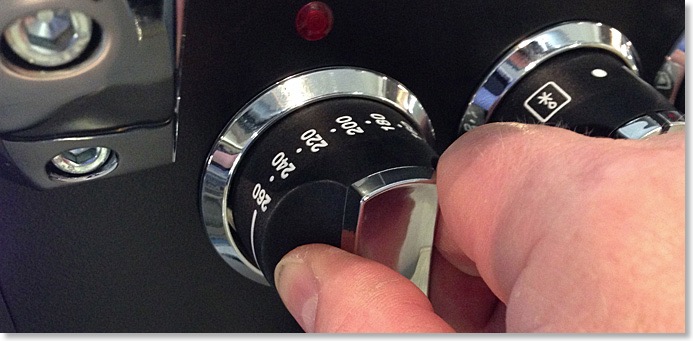Oven Temperature Accuracy - A Movable Feast
30/09/13 16:52 Filed in: Help & Advice
We sometimes hear from customers querying the temperature accuracy of their oven, and it is fair to say that his will vary a bit from brand to brand, but the truth is that with any cooker you may experience a discrepancy with what the control knob says and the actual temperature within the oven, and there is an industry tolerance of around 15%.

Usually this is not too much of an issue, and most cooks get to know their oven well enough to adjust things accordingly. Where it is critical, most will invest a few pounds in a separate thermometer which they can put in the oven and monitor the actual temperature accurately, or a meat thermometer which sticks into a joint of meat to show when it has reached the optimum heat level. Some ovens will actually include a meat probe which works in conjunction with the oven programmer - a useful and clever add-on found more usually on top-end integrated ovens, but recently introduced by Britannia onto their new Britannia Delphi range cooker models. This means the cooking is controlled by the target temperature rather than the time.

Some range cookers (Rangemaster Classic 90 and Elan, Stoves Richmond 90) may feature a traditional temperature gauge on the oven door, but no temperature scale is printed so it is purely a relative visual reference to give you a rough idea what is happening inside. Looks nice, though.
We always remind people to ensure that they take out what engineers refer to as "backlash" - the small amount of sloppiness in any rotating control - by turning the knob
Of course don't forget to adjust the temperature if you are using a fanned oven, as this distributes heat evenly throughout the cavity rather than relying on convection and adds 20-30°C or so to the effective temperature, so cooking time needs to be reduced (if you are in a hurry), or the temperature set lower accordingly.
 to browse all range cookers
to browse all range cookers

Temperature dials can be a little hit-and-miss, but most users make their own adjustments
Usually this is not too much of an issue, and most cooks get to know their oven well enough to adjust things accordingly. Where it is critical, most will invest a few pounds in a separate thermometer which they can put in the oven and monitor the actual temperature accurately, or a meat thermometer which sticks into a joint of meat to show when it has reached the optimum heat level. Some ovens will actually include a meat probe which works in conjunction with the oven programmer - a useful and clever add-on found more usually on top-end integrated ovens, but recently introduced by Britannia onto their new Britannia Delphi range cooker models. This means the cooking is controlled by the target temperature rather than the time.

Oven temperature gauges and meat probes can help you achieve more accurate cooking conditions and better results
Some range cookers (Rangemaster Classic 90 and Elan, Stoves Richmond 90) may feature a traditional temperature gauge on the oven door, but no temperature scale is printed so it is purely a relative visual reference to give you a rough idea what is happening inside. Looks nice, though.
Rangecookers.co.uk's Top Tip for Oven Accuracy
We always remind people to ensure that they take out what engineers refer to as "backlash" - the small amount of sloppiness in any rotating control - by turning the knob
beyond
then back to
the desired position. This will usually make all the difference and put you within an acceptable range of where you want to be.Fanned Ovens
Of course don't forget to adjust the temperature if you are using a fanned oven, as this distributes heat evenly throughout the cavity rather than relying on convection and adds 20-30°C or so to the effective temperature, so cooking time needs to be reduced (if you are in a hurry), or the temperature set lower accordingly.
 to browse all range cookers
to browse all range cookers






